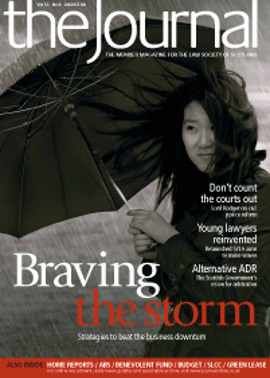The Society's future role in complaints handling

The opening of the Scottish Legal Complaints Commission on 1 October represents a new era for the Law Society of Scotland in terms of handling complaints. However, it is clear from some letters received from practitioners after we issued the annual levy invoices, that there is confusion over the Society’s future role. This article will clarify that role and its effect on the Society’s operation.
When the Legal Profession and Legal Aid (Scotland) Act 2007 was passing through the Scottish Parliament, it was agreed that the Commission would be the gateway for all complaints against solicitors, handling service complaints itself and passing conduct complaints to the Society. Initial discussions indicated that the Society would continue to receive and handle service complaints up to 1 October 2008 and the Commission would handle all new service complaints after that date. That, however, is not now the case. Under the Commission’s rules, the new organisation will only handle service complaints where the business was instructed with the practitioner on or after 1 October.
Unchanged workload – for now
That has significant ramifications for the Society, in particular in terms of the cost and the role of the Client Relations Office. It was always anticipated that the Society would investigate the service complaints already received before the Commission opened its doors, through to a conclusion. However, if we were to continue to meet the publicly stated target of handling 90% of complaints within nine months, it was expected that the Society would conclude its last service complaint in late 2009. That timescale is now unrealistic. The Society must continue to handle service complaints received after 1 October where the business was instructed before that date, and therefore our workload will be maintained at the current level for at least the next year.
The Society recently announced that, as of 1 October, it will reduce the time limit for making a complaint from the current two year period to one year. This is in line with the Commission’s planned rules and will limit the run-on time for the Society. The transitional provisions that bring the Legal Profession and Legal Aid (Scotland) Act into force are also likely to include a provision ensuring the Society will handle no new service complaints after the Commission has been open for two years, irrespective of the date of the instruction.
Practising certificate costs
A number of practitioners responding to the levy invoice clearly expected that the opening of the Commission would result in an immediate reduction in the Society’s work and costs, and therefore a lowering of the practising certificate subscription. As the Society will have as much work over the coming year (in addition to liaison with and monitoring of the Commission), the cost of the Client Relations Office will remain at its current level and there can be no reduction in the practising certificate on that basis.
The Commission is an independent body and its budget has been approved by the Scottish Parliament. It is worth noting that the Society’s complaints handling system has been subsidised for many years by the goodwill of solicitors and non-solicitors who prepare reports and sit on committees. The Commission will not replicate that process and its costs will be higher. In fact, it will cost more for the Commission to deal with service complaints alone than it does for the Society currently to handle all complaints.
New conduct provisions
From 1 October, the Society will be able to make a finding of unsatisfactory conduct against a solicitor, as well as continuing to refer allegations of professional misconduct to the Scottish Solicitors’ Discipline Tribunal. This will require continuation of some committees to deal with conduct complaints. As the Journal has already reported, there will be an explanation in next month’s edition of the process for handling conduct complaints where business is instructed after 1 October. For ease of understanding by both practitioners and the public, the Society and the Commission will have similar processes for handling different types of complaints.
Due and payable now
A number of practitioners have asked why the levy is to be paid in advance of the Commission opening. That was always going to be the case. Whilst the Scottish Government has indicated that it will meet the start-up costs, the 2007 Act always made it clear that the Commission would consult on its budget, and the levy categories, between January and March and then have its budget approved by Parliament in April. As reported to members in the Journal, the e-bulletin and on our website, that is exactly what the Commission did earlier this year. The Commission is entitled to request the professional organisations to pay the total sum due in advance of the Commission opening. The Commission’s first budget is for a nine-month period to 30 June next year. If the money collected from the profession exceeds the actual running costs of the Commission, any surplus will be carried forward into the budget for future years.
It is important that the profession is aware how the Commission will gather and carry forward its costs. As the Society will continue to have a statutory duty to handle conduct matters and, for a significant period of time, service complaints, the expectation of some practitioners that the arrival of the Commission and the payment of the levy will bring about a reduction in the practising certificate fee is simply not the case.
At present, the Society is considering its budget for 2008-09. The process for the budget and the setting of the subscription is a rigorous one. Proposals for the subscription for the practice year starting on 1 November will be put to Council members in August, following which they will go forward to the Special General Meeting in September for consideration and approval by the membership. Following the August Council meeting, all members will be advised of the proposed subscription rates.
No shortfall permitted
Finally, it is important to remember that the Society has a statutory duty to pay all sums due to the Commission by the solicitor branch of the legal profession, whether or not we have successfully collected that money from members. Any shortfall will ultimately be met by the remainder of the profession. The Society, which has the power to recover the annual levy from someone holding a practising certificate, through a court action and/or by raising a complaint, will consider its options in the event of a shortfall.
Raised court fees in force
New tables of court fees for the Court of Session and sheriff court came into force on 1 August 2008, raising fees in those courts by an average of 49% and 31% respectively, in furtherance of government policy to shift more of the cost of funding the courts from the general taxpayer to court users.
The relevant orders, SSI 2008/236 for the Court of Session and SSI 2008/239 for the sheriff court, also contain new tables of fees to apply from 1 April 2009 and 1 April 2010 respectively, when fees will be further increased in line with inflation.
Scottish Court Service has issued a reminder of the right to claim exemption from fees in certain circumstances where:
(a) the person or his or her partner is in receipt of income support;
(b) the person is in receipt of an income-based jobseeker’s allowance;
(c) the person is in receipt of civil legal aid in respect of the matter in connection with which the fee is payable;
(d) the fee is payable in connection with a simplified divorce or dissolution of a civil partnership application and the person is in receipt of advice and assistance from a solicitor in respect of that application;
(e) the person’s solicitor is undertaking work in relation to the matter in connection with which the fee is payable on the basis of regulations under s 36 of the Legal Aid (Scotland) Act 1986 providing for legal aid in a matter of special urgency;
(f) the person or his or her partner is in receipt of guarantee credit under the State Pension Credit Act 2002; or
(g) the person or his or her partner is in receipt of working tax credit, provided that–
(i) child tax credit is being paid to the party, or otherwise following a claim for child tax credit made jointly by the members of a couple which includes the party; or
(ii) there is a disability element or severe disability element (or both) to the tax credit received by the party;
and that the gross annual income taken into account for the calculation of the working tax credit is £16,017 or less.
Professional ethics conference
The Scottish Forum for Professional Ethics invites all professional bodies in Scotland, and their members, to its inaugural conference on the morning of Monday 8 September in the Playfair Library Hall, University of Edinburgh.
Addressing the issue “What is the role of professional bodies in 21st century Scotland?”, speakers will be Professor Sir Kenneth Calman, Chancellor of the University of Glasgow, and Professor Gordon Kirk, former Vice-Principal of the University of Edinburgh.
To register for the conference, go to the quick links section at www.glasgow.ac.uk/sfpe. For enquiries contact the Conference and Visitor Services Office on 0141 330 5385.
Public Law Group reviews FOI
The Scottish Public Law Group’s autumn seminar, “Scotland’s FOI Regime”, will be held on Thursday 18 September 2008 from 5.30-7pm, in Conference Room 1, Scottish Government, Victoria Quay, Edinburgh EH6 6QQ.
Chaired by Ros McInnes, solicitor, BBC Scotland, with panellists from the Scottish Government, the Campaign for Freedom of Information and the Scottish and UK Information Commissioners’ Offices, the event will review the experiences and practice of how FoI is operating in Scotland and beyond.
Tea and coffee will be served from 5pm, and drinks afterwards until 7.30pm.
The event is free and open to all, but those wishing to attend are requested to advise Sandra Crace at sandra.crace@scotland.gsi.gov.uk. More information about the Group can be found at www.splg.co.uk
In this issue
- Where have we come from, where to next?
- Shifting sands
- A rank bad rule
- Braving the storm
- Civil justice: where next?
- Title Conditions Act: new registration procedures
- Young lawyers reborn
- Shining some more light...
- Power to the tribunal?
- Piece by piece
- The poor in our midst
- The Society's future role in complaints handling
- Appreciation: Lord Johnston
- Professional Practice Committee
- Facing the lean years
- It's a web 2.0 world
- Questions, questions
- Bare necessities
- Coming on the blind side
- Relocation, relocation
- Worse than the disease?
- Sleeping bounty
- Scottish Solicitors' Discipline Tribunal
- Website reviews
- Book reviews
- Industry standard
- Meet the committee
- What's in a motto?
- Leasing by example
- Good call?
- Home reports - the practice questions






